Can Chaplains Work for Government Agencies?
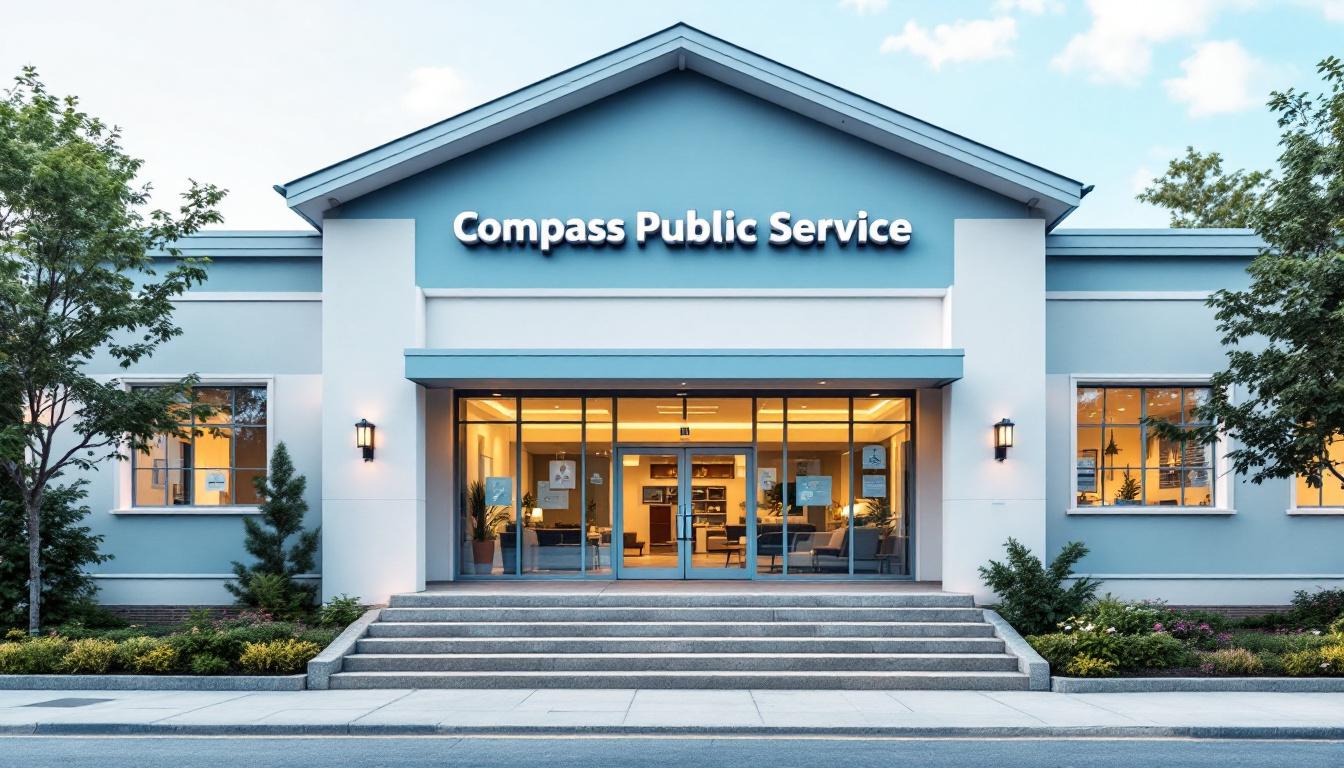

Chaplains have long been integral to various institutions, serving spiritual, emotional, and moral needs within military, correctional, healthcare, and law enforcement contexts. With increasing recognition of mental health and holistic well-being, the question arises: can chaplains work for government agencies? This article explores the qualifications, roles, organizational placement, and legal considerations surrounding chaplaincy in public sector institutions.
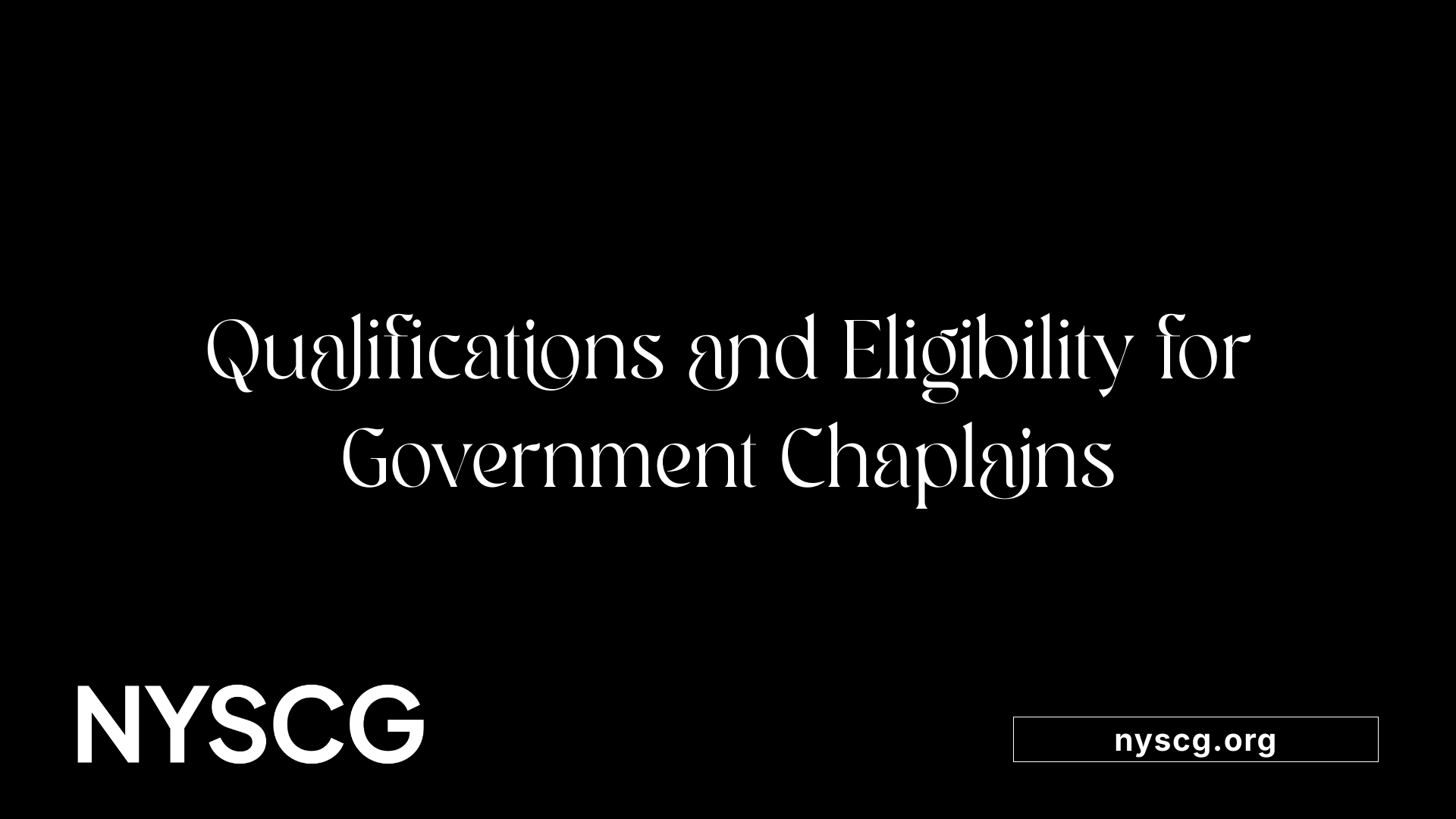
Working as a chaplain within government agencies involves meeting several specific qualifications. A fundamental requirement is educationally grounded; candidates must hold at least an undergraduate degree from an accredited university. More advanced educational credentials are typically expected, including a Master of Divinity (MDiv), Master of Theological Studies (MTS), or similar advanced degree in theology, ministry, or religious studies.
Endorsement and ordination from a recognized religious authority are critical for official recognition and certification. This endorsement acts as a formal verification of the chaplain’s spiritual and moral standing, and their licensing or ordination ensures they are qualified to perform religious rites and provide spiritual counseling.
Experience is equally essential. Candidates should have a minimum of two years or approximately 4,174 hours of pastoral work, which can include leadership roles in faith communities or specialized ministry settings. In healthcare environments, completion of Clinical Pastoral Education (CPE) is strongly advised or required, providing practical, supervised training in spiritual care.
Personal qualities play a major role. Successful applicants must display emotional stability and moral integrity, demonstrating the ability to relate compassionately with individuals from diverse backgrounds. Additional prerequisites include passing background checks, obtaining references, and fulfilling age requirements—generally between 21 and 37 years, though age waivers might be available.
Residency requirements vary by agency but can include living within a certain jurisdiction. Certification from professional chaplain organization standards enhances credibility and employment prospects.
Overall, these standards ensure that government chaplains are well-prepared to serve diverse communities effectively, upholding the integrity and professionalism necessary for such a vital role.
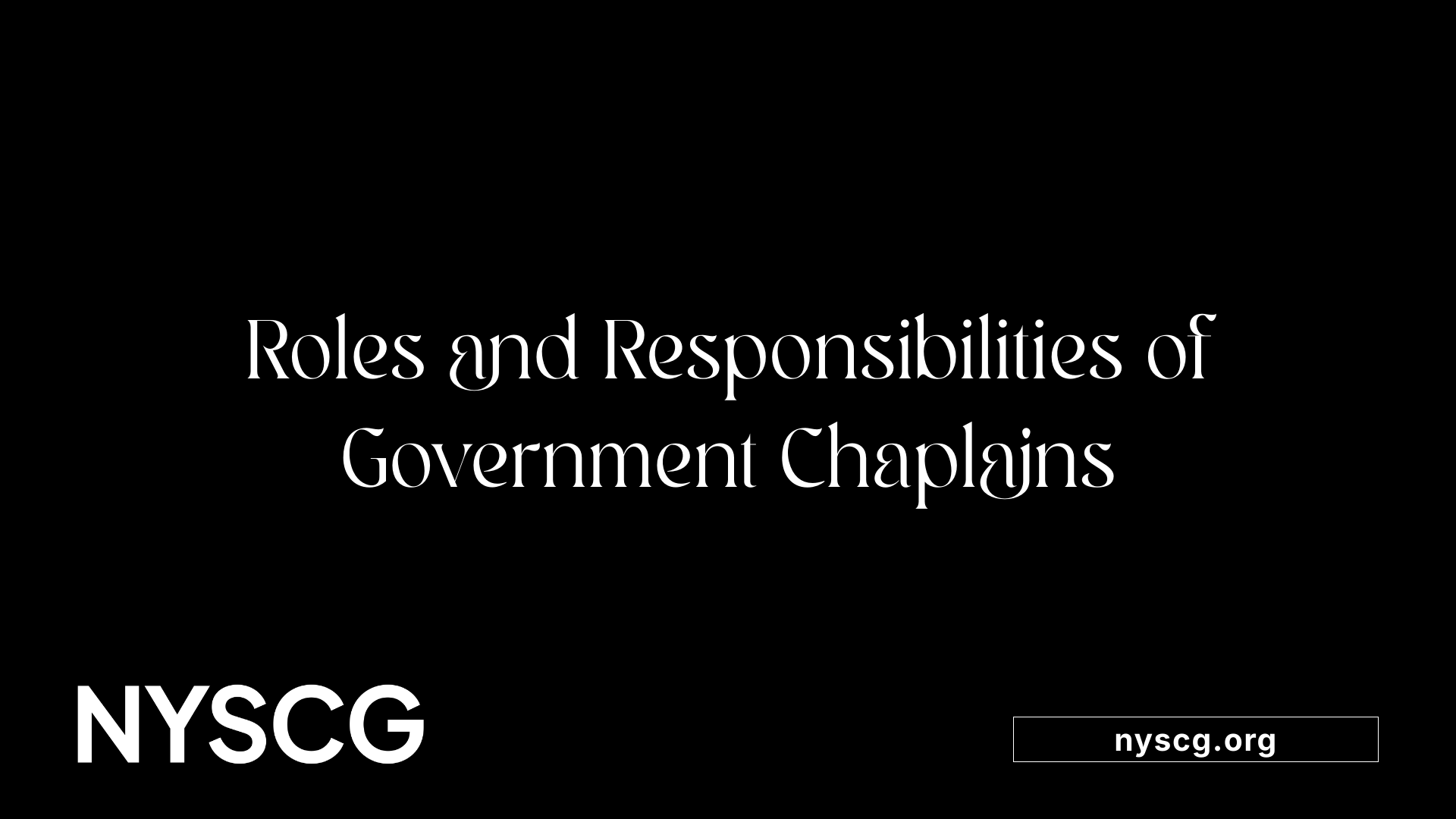
Chaplains working within government agencies play a vital role in providing spiritual, emotional, and moral support to their respective communities. They serve a diverse population that includes service members, veterans, inmates, law enforcement officers, and other personnel.
A primary responsibility of government chaplains is to conduct religious services and facilitate spiritual activities that align with various faith traditions. This includes administering sacraments, performing religious rites, and leading prayers or worship sessions. They also organize educational programs about different religious beliefs to foster understanding and respect among diverse groups.
Confidential counseling is a fundamental aspect of their duties. Chaplains support individuals facing personal, familial, or occupational challenges, offering guidance and solace in times of stress, grief, or illness. They are key figures during crises such as traumatic events, as they provide immediate emotional support and help navigate complex moral or ethical dilemmas.
In settings like military base commands and correctional facilities, chaplains focus on promoting moral wellness and supporting mental health. They work to uphold ethical standards, help individuals make moral decisions, and foster a sense of community and cohesion. Their work often extends to educating and mentoring individuals to strengthen their resilience and faith.
Throughout all these functions, confidentiality and respect for religious diversity are paramount. Chaplains maintain a professional boundary, ensuring that their support respects individual beliefs, whether religious or secular. Their compassion, active listening, and cultural sensitivity make them indispensable in promoting well-being and community spirit within government institutions.
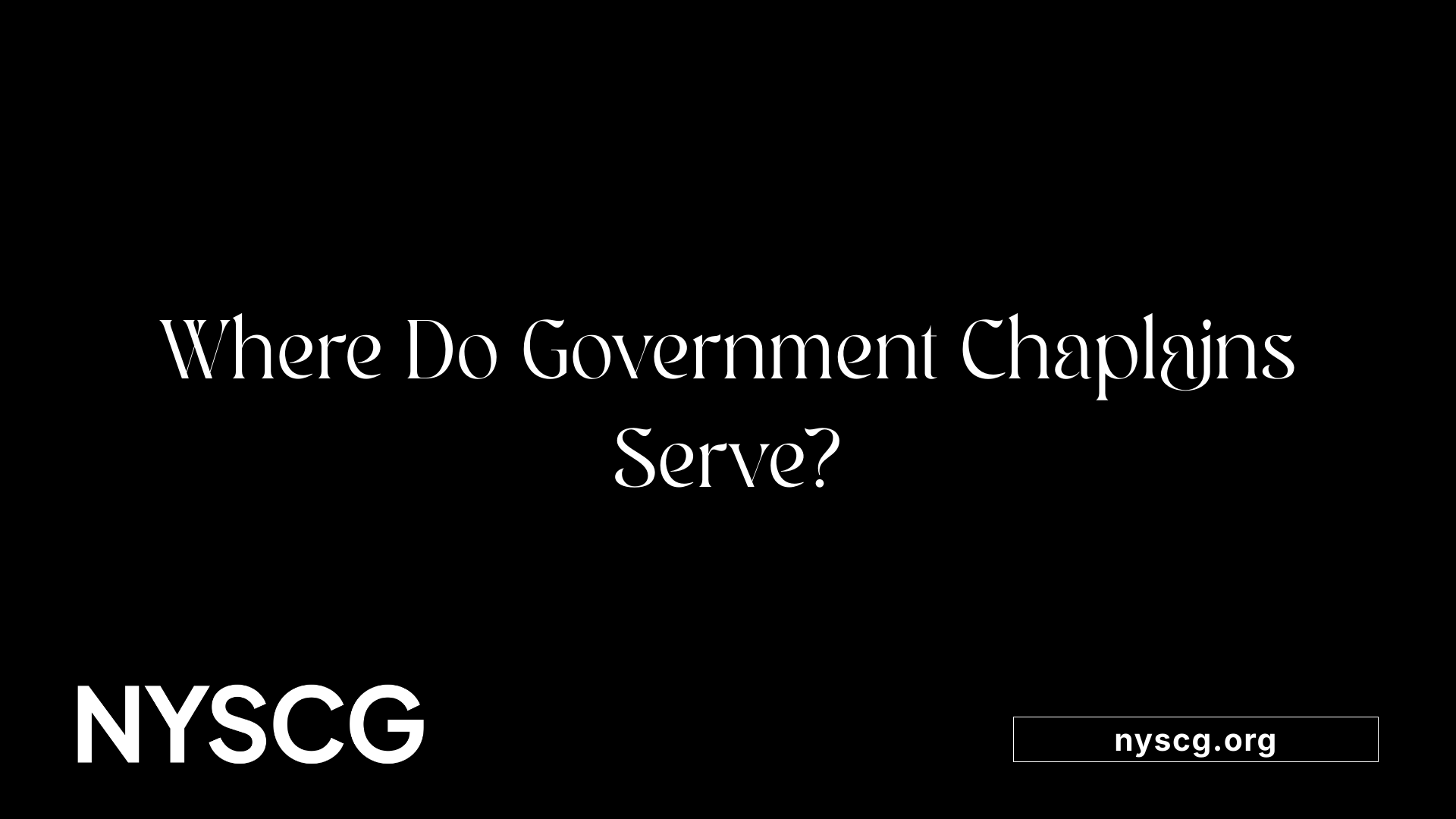
Chaplains are embedded within various government agencies, serving in positions that support the spiritual, emotional, and moral well-being of personnel and specific populations such as inmates or veterans. Their placement is regulated through formal policies and standards that ensure proper oversight and ethical conduct.
In the military, chaplains are recognized as credentialed clergy who serve across different branches, including the Army, Navy, Air Force, and Marine Corps. They operate within military units, hospitals, and specialized units such as cyber or medical groups. Their role includes conducting worship services, providing counseling, and supporting Soldiers and their families both during peace and war.
Within the Department of Veterans Affairs (VA), chaplains offer spiritual assessments, crisis interventions, and pastoral care as part of healthcare services provided at VA medical centers and community clinics. They are employed full-time, part-time, or on a contractual basis, meeting rigorous educational and endorsement standards.
Correctional facilities, including federal prisons, employ chaplains to administer religious services, provide counseling, and supervise faith-based programs for inmates. These professionals are usually ordained or endorsed by recognized faith bodies and hold degrees such as a Master of Divinity.
Law enforcement agencies sometimes include chaplains in their support staff, offering crisis intervention and moral guidance, especially during critical incidents. They operate within established policies that respect the constitutional separation of church and state while supporting personnel and community relations.
Chaplains in military units perform duties like conducting worship, administering sacraments, and providing spiritual counseling to service members and their families.
In VA healthcare settings, chaplains perform spiritual assessments, lead religious rituals, and provide emotional support to Veterans and their families, recognizing spiritual health as crucial to overall well-being.
Correctional chaplains oversee religious programming for inmates, ensuring access to various faith traditions while maintaining security and compliance with institutional policies.
Chaplains are not only frontline spiritual caregivers but also integral members of the administrative structure. They develop and oversee programs that serve diverse populations, supervise lower-level chaplains or volunteers, and ensure that services comply with legal, ethical, and organizational standards.
In military and correctional contexts, chaplains often hold supervisory roles, guiding teams of chaplain assistants or volunteers, and coordinating large-scale religious activities or outreach programs.
Overall, their integration into government organizations ensures that spiritual care is a structured, ethical, and supportive component of service, aligned with national policies and specific institutional needs.
SettingRoleStandard RequirementsAdditional NotesMilitaryConduct worship, provide counselingEndorsed by faith group, Master of DivinityOperate in active duty or reserve unitsVA HealthcareSpiritual assessments, crisis supportEndorsed, clinical pastoral educationPart of holistic Veteran careCorrectional FacilitiesReligious services, inmate supportOrdination or endorsement, relevant experienceSupervise faith-based programsLaw EnforcementCrisis intervention, moral guidancePolicy-respecting support rolesEnsure constitutional and ethical compliance
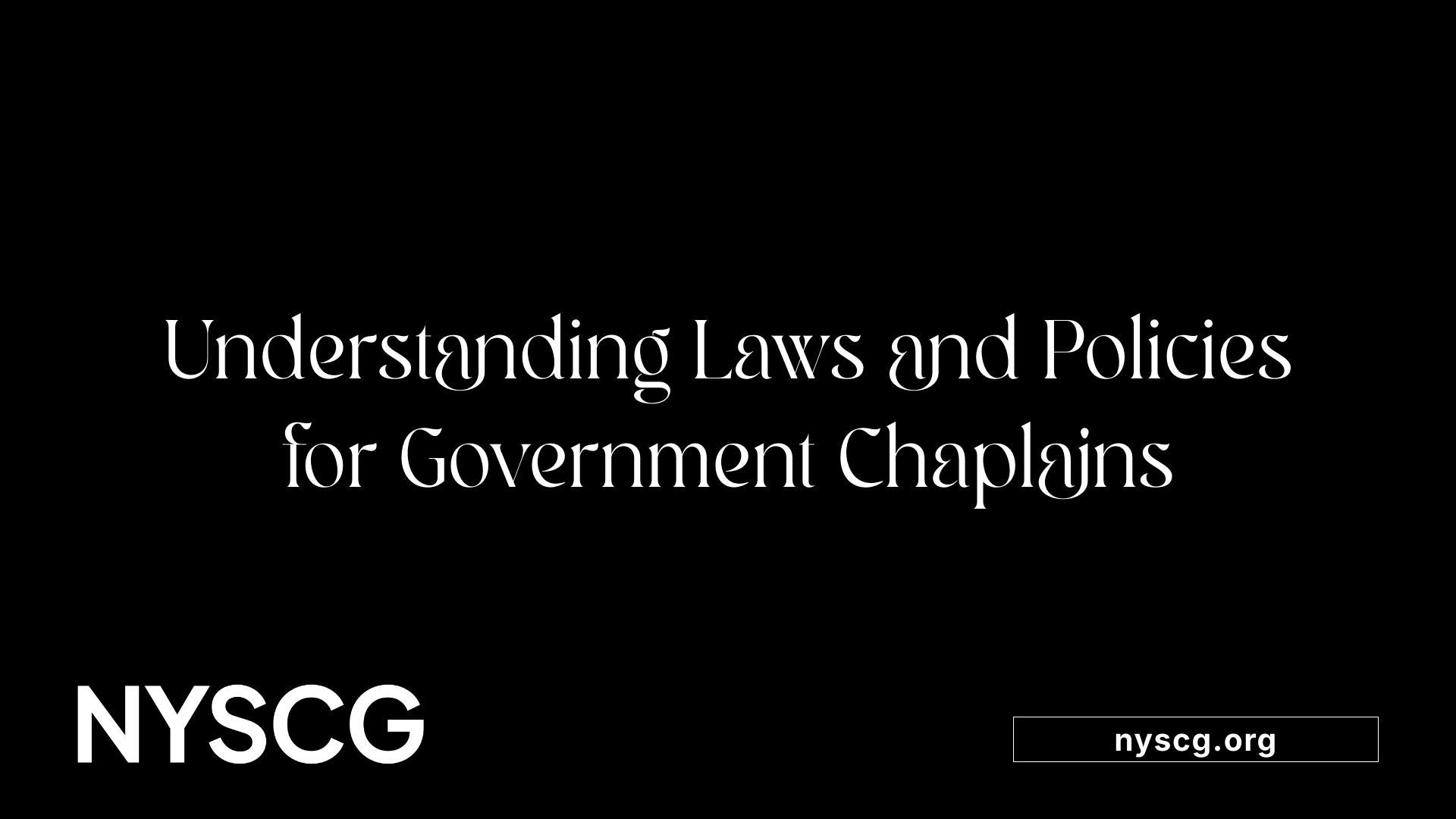
Government chaplains operate within a framework of laws, policies, and regulations designed to uphold religious freedom while ensuring neutrality and fairness. For military chaplains, adherence to directives such as Department of Defense Instruction 1304.28 is essential. This instruction outlines the qualifications, endorsement requirements, and responsibilities for chaplains serving in the armed forces, ensuring they meet specific standards while respecting the diverse beliefs of service members.
Compliance with laws protecting against religious discrimination is also vital. These laws mandate that government agencies treat all individuals equitably, regardless of their faith or lack of belief. Chaplains must provide support that is inclusive and non-coercive, respecting the rights of employees and clients of all religious backgrounds.
Policies regarding confidentiality, scope of practice, and religious accommodation further guide chaplain conduct. Confidentiality is maintained to foster trust, while scope of practice delineates what chaplains can and cannot do—such as providing spiritual care without crossing into proselytizing or endorsing specific religions.
Overall, these legal and policy considerations ensure that government-employed chaplains serve their roles effectively, ethically, and in a manner that respects both individual rights and institutional neutrality.
Chaplains serve a vital role within government agencies, bridging spiritual, emotional, and moral support across diverse communities. With clearly defined qualifications, responsibilities, and regulatory frameworks, they are authorized and equipped to serve in various public institutions. Their presence promotes well-being, ethical conduct, and community cohesion, illustrating that faith and public service can work hand in hand. As society continues to value holistic health and moral integrity, the role of government chaplains remains both relevant and essential.
All you need is the will to make the world a better place.
New York State chaplain group inc. is a tax deductible organization with a federal tax Id number 92-383-4921